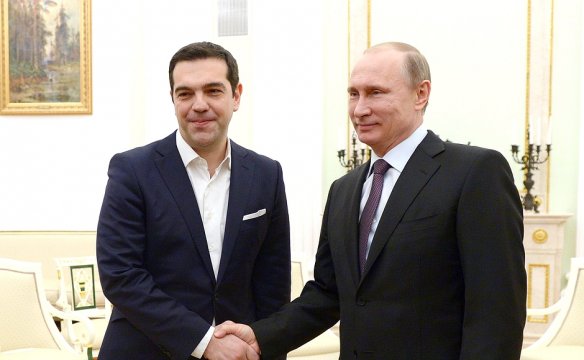The striking outcome of this Sunday’s Greek referendum is that the collective attitude departed so decisively from common sense. The question on the ballot was convoluted, but the voters were well-informed about the EU’s demands. Having spent a week lining up at ATMs, Greeks grasped the reality of the coming bankruptcy—and yet, they chose to reject the clear demands of their creditors.

Vladimir Putin and Alexis Tsipras meeting in April. Photo: www.kremlin.ru
One important part of the explanation for an apparently self-punishing choice is Russia. Many Greeks see Russia as a state that upholds its sovereignty and defies the EU diktat. This rosy view—centered on the idea of dignity—conveniently overlooks Russia’s aggression against Ukraine and its threats against the independence of the Baltic states.
But never mind, what matters is Russia’s sympathy for their travails. This sympathy was richly supplied to Prime Minister Alexis Tsipras, who, in mid-June, took a break from the difficult negotiations with the Brussels bureaucrats to attend the St. Petersburg economic forum. He returned with no financial aid, which Russia is incapable of providing, but with a promise of a new gas pipeline to channel Russian gas to Europe through Greece. The promise is cheap, since the hastily conceived and hugely expensive project will probably never materialize (not to mention that Turkey is less than enthusiastic about the route). Nevertheless, to the desperate Greeks, it appeared the best hope for escaping the clutches of their European creditors.
Russia has encouraged Greek defiance of the EU not because of a historic affinity with Greece. Rather, Russia has its own issues with Europe. Having found itself economically boxed in after its invasion of Ukraine, Moscow needs to bolster its own belief in Western weakness. Official Russian propaganda paints the EU as morally corrupt and politically divided. In this context, the Greek “No” boosts morale. Between 60 and 70 percent of Russians now express an unfavorable opinion of the EU—a reversal from previous decades, when favorable opinions were in a similar range.
- Read more at the Bookings Blog Order from Chaos, where the full text was published 8 July 2015.